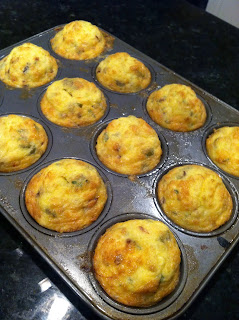 | |
| egg muffins |
The research I've come across has led me to believe that insulin resistance has a lot to do with weight gain and weight loss. I feel this is a really good, simple explanation.
" Insulin sensitivity has to do with how well your cells respond to insulin. People that are highly insulin sensitive require very little insulin to store carbohydrates. By reason then, people that are insulin resistant (type II diabetics), need larger amounts of insulin to shuttle those carbohydrates around.
What this means is that when you have high insulin sensitivity, you are able to eat carbohydrates without such a large rise in insulin. When insulin is kept low enough, fatty acids can still be released. However, once insulin gets too high, fat loss comes to a halt. People that have bombarded their bodies with high-glycemic carbohydrates and processed foods over their lifetimes have become somewhat resistant to the effects of insulin. Therefore, when they eat carbohydrates, it causes a larger release of insulin. This inhibits the release of fatty acids.
Higher insulin levels = more fat storage"( Coach Calorie)
Another issue on insulin, I was confused about how fructose is constantly said to contribute to insulin resistance when it uses a non-insulin dependent pathway for metabolism. I was reading the articles on The Paleo Diet
and I came across this article Hyperinsulinemic diseases of civilization: more than just syndrome X where this was discussed. According to the article, when fructose is in the presence of glucose (as in high fructose corn syrup and table sugar) it is insulintropic. This means it will cause the release of insulin from the cells. Furthermore, this article talks about insulin sensitivity and the result of increased insulin release to lead to more conditions that what we thought, namely balding in men, acne, myopia and PCOS.
It seems that insulin resistance is a big deal. However, if you're not reading about it on blogs or once in a while in a health magazine, what are people learning to do to deal with this problem? Being prescribed medications? The ever evasive "eat less"? Health care practitioners do not want to mention the Paleo Diet. They may not know about it or are mislead into calling it a "fad diet". Like I learned in some of my nutrition classes, "there are no bad foods". I disagree. There are bad foods. If you eat it and it makes you sick it is a bad food. If I eat foods with high amounts of salicylic acid, egg plant for example, I get severe stomach pain and eventual ulcerative colitis! That is a bad food for me. The reality is, if your body cannot handle sugar, why keep eating sugar? If your body cannot tolerate rice and bread, why take drugs (that have their own side effects) to be able to continue eating it, until your pancreas completely gives out and your tissues are completely resistant? I think the answer to how to deal with the increasing incidence of metabolic syndrome is much easier than we are lead to believe, but it's much more difficult at first to change your eating than it is to take a pill.
No comments:
Post a Comment